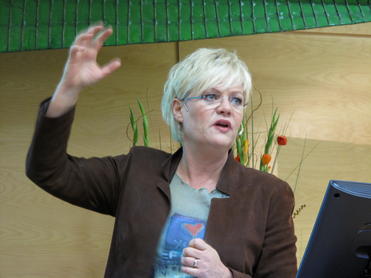Foreign Minister Jonas Gahr Støre thinks he’s “morally superior” and smarter than most, while Prime Minister Jens Stoltenberg is “not a strong leader.” These are among US diplomats’ assessments of top Norwegian politicians, unveiled by WikiLeaks and Scandinavian media.

Newspaper Aftenposten devoted four full pages in its Tuesday edition to the contents of new documents made available by website WikiLeaks. Aftenposten reported that its reporters have spent several days going over the documents, in cooperation with Swedish newspaper Svenska Dagbladet.
The documents stem mostly from the US Embassy in Oslo but also from the US Embassy in Sri Lanka, where Norway played a central role in trying to broker peace. Other documents were sent by the US State Department to the embassy in Oslo, asking for comment or issuing instructions on various issues involving relations between the US and Norway. The oldest, according to Aftenposten, are from 2002, the most recent from this year.

Foreign Minister Jonas Gahr Støre gets surprisingly rough treatment in the so-called “confidential cables.” Støre has long been the star of the left-center coalition government led by Prime Minister Jens Stoltenberg, and scores highest of all the government ministers in public opinion polls. US diplomats have a vastly different view of him, and almost seem jealous or nervous about his success.
Støre is described as a “hyperactive” politician who involves himself in everything. The diplomats found it necessary to warn US Secretary of State Hillary Clinton about some of Støre’s traits, including “his arrogance,” which they claimed may not work well during negotiations.
Støre is viewed as “smart and dynamic,” but also conceited and “morally superior,” a man who thinks he’s smarter than most others. It appears some US diplomats wanted to knock Støre down in size, suggesting that he “probably needs to hear from Washington” that “too many” unexpected initiatives (including a much disliked initiative against cluster bombs) could hurt his credibility and standing among “friends.”

Støre himself tried to brush off the criticism, telling Aftenposten he wasn’t surprised the US has viewed Norway as naive at times, and was taken aback when Norwegian officials voice their opposition to US policies. “I can live well with that,” Støre said.
Other Norwegian politicians also were described in highly undiplomatic terms, by diplomats who thought their views would remain confidential. Former Defense Minister (now Health Minister) Anne-Grete Strøm-Erichsen was called “one of the weakest” ministers in the government, completely “overshadowed” by stronger personalities like Støre, Kristin Halvorsen and Erik Solheim, the minister in charge of Norway’s foreign aid and the environment.
Halvorsen, from the Socialist Left party (SV), was treated with the most disdain, not least because her party has long opposed Norway’s membership in NATO. The Americans called SV “irresponsible,” and expressed relief when she had to concede some of her positions for the sake of government unity. They claimed she was chastened, and hoped she’d stay quiet for awhile.
Current Oil and Energy Minister Terje Riis-Johansen was called “weak” and easily steered by the bureaucrats, according to the US dispatches, while Stoltenberg himself allegedly likes to portray himself as a young and energetic leader, rather like Tony Blair used to be in the UK, but that he’d rather talk about Norway’s gold medals in the Olympics than foreign policy.
Former US Ambassador Benson Whitney went so far to suggest in one cable that Støre, Halvorsen and Solheim were trying to change foreign policy consensus and distance Norway from the US. If that can’t be “controlled,” Whitney warned ominously, it could threaten the US’s close ties to Norway.
Views and News from Norway/Nina Berglund
Join our Forum if you’d like to comment on this story.

